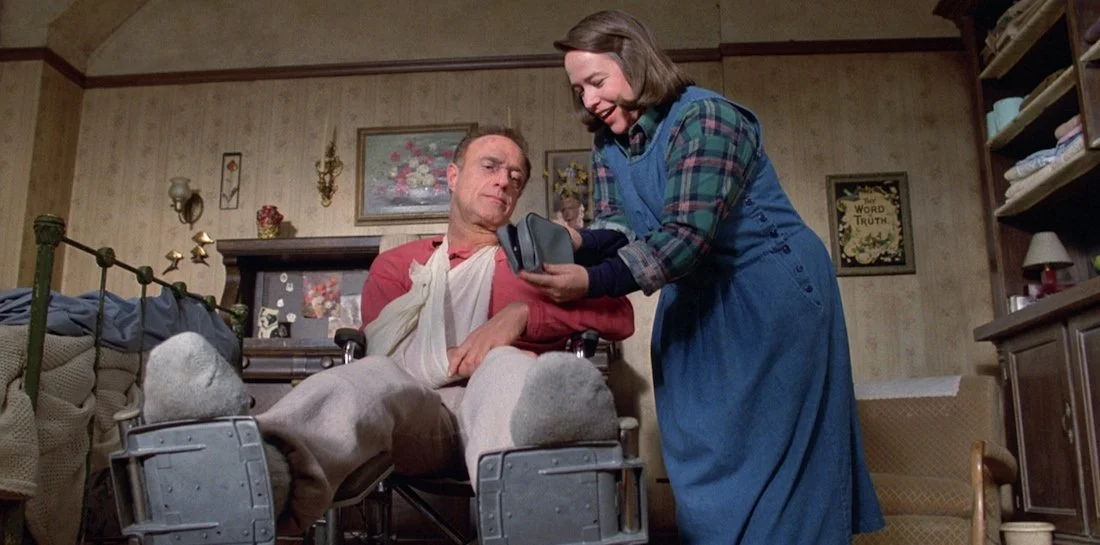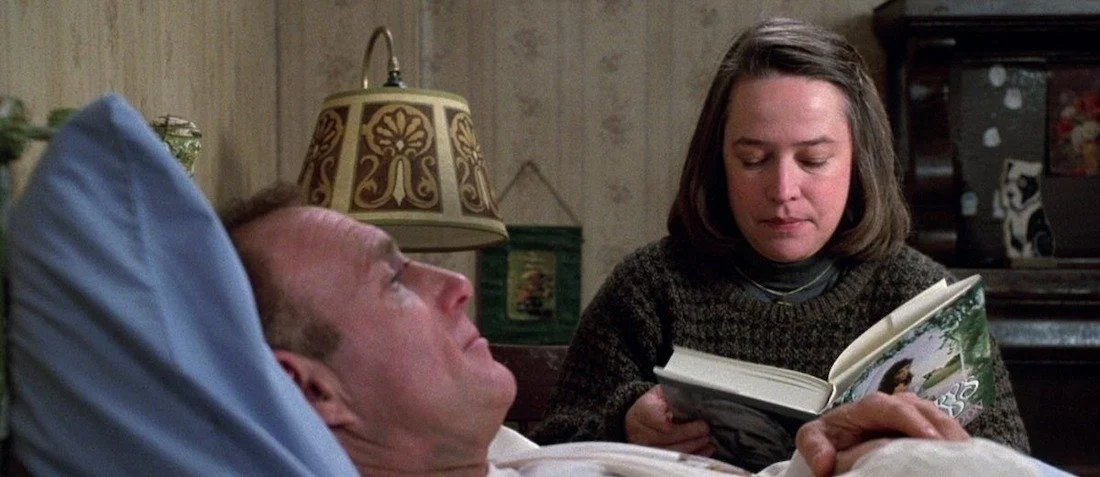The Pumpkin King: MISERY (1990)
The Case For Annie
A lot of MISERY takes place in nurse Annie Wilkes’ isolated cabin in the mountains of Silver Creek, Colorado. While the audience may overwhelmingly agree that writer Paul Sheldon is the protagonist of the story, there’s an argument to be made that while he may not be the antagonist, he certainly antagonized Annie to the point where she allowed herself to succumb to that role herself.
Misery is a psychological horror thriller novel written by Stephen King in 1987.
While the novel had been considered unadaptable at one point, Stephen King wanted to ensure that the story was adapted by the right people. Written because King felt trapped writing within the same genre, Misery’s rights were optioned by producer/director Rob Reiner and producer Andrew Scheinman with William Goldman writing the script.
Watching the movie adaptation and knowing that there are plenty of notable differences between the book and film, it’s still easy to see how King saw himself as the fictional Paul Sheldon and how fans kept him boxed in the horror and thriller genres. On the other hand, Annie Wilkes can be seen as a representation of fandoms and audiences who love content creators’ works to the point of obsession.
Obsession is depicted as the ultimate perversion of the audience’s role in the relationship between creators and receivers, but the movie also invokes the question of whether artists have a duty to create content they know caters to audience expectations and comfort levels.
The movie begins with writer Paul Sheldon completing the manuscript for his next book and leaving his cabin to get it to his editor in New York. After getting into a car accident, Paul is pulled from the wreckage by a mysterious figure who gives CPR, grabs his manuscript, and carries him away. The audience is quickly introduced to a nurse named Annie Wilkes who was the mysterious figure that saved Paul’s life. She’s been tending to him for two days and immediately reveals herself as his “number one fan.” Doting on his books, she signals that his Misery novels are her favorite as she’s memorized all eight of them. Annie doesn’t react to Paul’s lack of engagement with her, but the audience takes note of his discomfort with her stating that she knew that he was staying up the mountain and that it was fated for her to save him.
Throughout the 1990 movie, there are multiple scenes of Annie coming in and out of Paul’s room to check in and take care of him. Their interactions mainly consist of Annie emphatically showering Paul with words of love and devotion toward his work. She’s kind and thorough in her care for him and is met with a silent judgment by Paul who seems to think something is off about her or doesn’t love the idea of being indebted to someone who labels themselves as his biggest fan. When Annie asks about his briefcase holding what she assumes to be his next work, Paul says she can read it and she’s overjoyed by such an “honor.” It likely would’ve been helpful for future Paul if he set expectations ahead of time with Annie to not maintain attachment to her favorite character, Misery Chastain.
After reading a few chapters, Annie asks Paul if swearing is necessary for the book and has a slight outburst over how “it has no nobility.” She immediately apologizes and tells Paul that she loves him for his mind and creativity. As a sign that she wants Paul to know more about her, she introduces him to her pet pig, Misery, and talks about how lonely life is at her cabin, but says that Misery has brought light and companionship to her life just like the character from Paul’s books. Further, she brings up her divorce and how she threw herself into her work at the hospital and into reading, which lead to her discovery of the Misery books. Paul meets every moment of Annie’s vulnerability with aloofness to the point where the audience can tell he sees her as beneath him and treats her as a nurse and nothing more. This dynamic creates empathy towards Annie, regardless of the sneaking suspicion that she’s lying to Paul about a lack of phone and road access due to the passing snowstorm.
At no point does Paul attempt to relate to or open up to Annie, but the biggest failure on his part is not warning Annie about the shocking ending of his book knowing that his book’s main character means so much to Annie to the point of being therapeutic for her. After she reads that Misery Chastain has died in Paul’s manuscript, the personal betrayal she feels sends her into a rage. Annie does suffer from a psychological disorder, confirmed by season two of Castle Rock where Annie’s prequel story is the main storyline, but the parallels with an audience whose favorite character is unceremoniously killed off are present. Audience reaction management can be tricky and there are some artists who cater their content to audiences and others, like Paul, who decide that they can create the work and vision they want without worrying about backlash. Every biting remark from Annie is met with an explanation behind his writing decision. Paul describes the history of women dying from childbirth in the 19th century and says that Misery’s spirit is what lives on, but it only makes Annie angrier to hear him justify her death stating that she thought Paul was a good one, but that he’s “just another dirty birdie.”
While Annie probably had it in her to cause physical harm to Paul, she left and cooled down before returning and calmly helping him back into bed after finding him on the floor. Paul never sympathizes with her, but she tells him that her thinking is muddy at times and that she was sorry that he saw her like that. She then reveals that “God told her that He delivered [Paul] unto her so she could show him the way,” leading her to force Paul to set fire to his manuscript. She introduces him to the wheelchair she procured for him and sets up a writing station with a table and typewriter, along with an expensive brand of paper. Paul meets her excitement with annoyance and asks for a different expensive brand of paper that doesn’t smudge. While Annie sees his point, she flies off the handle and lets him know that she doesn’t appreciate his lack of appreciation for all she’s done for him and goes to get his smudge-less paper.
A lot of dialogue about this movie is surrounded by Kathy Bates’ stellar Oscar-winning performance as Annie and how she doesn’t play the character as a single-note antagonist, but as an empathetic character that is met with James Caan’s stoic turn as his character is physically bound in what he finds to be a miserable situation. The push and pull between the characters in all their interactions slowly ratchets the story up and while it was probably always going to lead to Annie Wilkes’ psychosis being her downfall, there is probably an alternative world where Paul Sheldon met this fan with kindness and empathy and engaged in an open dialogue with her to explain why he as an author made the decision he made and what he wants for himself and his career. Annie may have been upset, but he could’ve instead treated her as a fellow human being with emotions and reverence for him rather than a disconnected reader.
Annie made a lot of bad decisions in her manic moments, i.e. the infamous hobbling scene, but I recommend fans of Stephen King—especially fans of MISERY—go watch season two of Castle Rock as it adds additional history and layers to Annie’s character that makes the movie quite saddening as she clearly managed her psychotic condition when she was younger but embraced the highs and lows of her emotional states and if Paul had given her the aforementioned empathy, she may have remained cordial and doting, allowing him to leave once he healed enough to take care of himself. While I stopped the article’s playthrough just before Annie’s near-constant state of mania, I recommend watching this movie from Annie’s point-of-view…at least up until the cockadoodie hobbling. Whether or not it was Stephen King’s intention in his novel (or William Goldman’s in his script) to have branching perspectives and potential insights within the storyline, this is an interesting perspective of the content creator-audience paradigm and the burdens that can come to either side.





